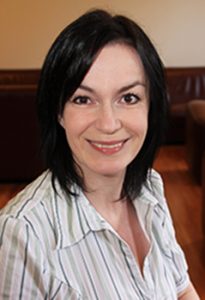
Political parties, gender politics, post-Soviet politics, electoral processes; Georgian and Moldovan politics
Background & Qualification
Karolina is an MA graduate of the Faculty of Law and Administration of the University of Gdańsk, Poland (2005). Karolina came to DCU with over 15 years of working experience with Polish, British and Georgian parliaments and local governments, a decade-long experience in various politics-related projects in the former USSR republics of Armenia, Azerbaijan, Georgia, Kazakhstan, Kyrgyzstan and Moldova and over a dozen years of cooperation with international organizations.
She knows the post-Soviet space well, having lived and worked in the region as a Parliamentary Program Manager for National Democratic Institute for International Affairs in Georgia; an OSCE/ODIHR expert in an on-going ‘Women in Political Parties’ program, a Netherlands Institute for Multiparty Democracy (NIMD) consultant and as an independent election observer in the de facto states of Abkhazia, Transnistria and Nagorno Karabakh.
Doctoral Research
Gender, political parties and parliaments in the post-Soviet states: A case study of Georgia and Moldova
Research Overview
This research examines the impact of the major factors that influence women’s legislative recruitment at a political party level in two post-Soviet states of Georgia and Moldova and aims to establish which processes and dynamics in these transition states best explain the different experience of women’s political engagement.
The ideology of the Soviet state promoted the principle of gender equality, however despite the high percentage of accomplished women in many professional spheres, such as science, education and even space, gender equality wasn’t reflected in the influential circles of political power. Democratic transformations in the region brought hope of a positive change for women, however the transition from the Soviet republic to independent states had a negative impact on women’s public involvement and influence compared to the Soviet period.
Georgia and Moldova, two most similar democratic countries in former USSR (excluding the EU member states), are a microcosm of the tensions in gender relations in the post-Soviet space. These states have common cultural traditions and a shared political history. However what stands out in the election results in Moldova and Georgia since the countries’ independence is the significantly different proportion of female MPs and different trajectories of women’s representation.
This thesis assesses the role of political parties in legislative recruitment of women in the case study countries by moving beyond descriptive representation, i.e., the number of female parliamentarians political parties introduce to parliaments. It focuses at the internal dynamics of the political parties to assess how they impact on the women’s political recruitment by analysing women’s access to party resources, promotion within the party, influence over the candidate selection process, election campaign support and access to media on party’s behalf as well as gender-balance of party leadership, and on how much power women hold in those organisations.
Contact Details
Supervisor
Selected Publications:
Peer-reviewed journals:
- Women’s political representation in the post-Soviet republics: parliamentary elections in Georgia and Abkhazia, Studies of Transition States and Societies, Volume 7, Issue 1, pp. 41-57, June 2015 (with Eileen Connolly) http://publications.tlu.ee/index.php/stss/article/view/215/182
- Gender and political representation in the de facto states of the Caucasus: Women and Parliamentary elections in Abkhazia, Caucasus Survey, Volume 3, No. 3, pp. 258–268, October 2015 (with Eileen Connolly) http://www.tandfonline.com/doi/pdf/10.1080/23761199.2015.1086570
- The Role of External Actors in Post-Soviet Frozen Conflicts, Contemporary Central Asia, Volume 17, No. 1, August 2013, pp. 30-48. (with Donnacha Ó Beacháin)
Other publications:
- Georgian politics: Gender imbalance and women’s (under)representation, 2015 Caucasus Analytical Digest, The issue on women in politics in the South Caucasus, March 2015
- Гендер и выборы в признанных и непризнанных государствах. Парламентские выборы 2012 г. в Грузии и Абхазии, Политическая наука (Politicheskaia Nauka), 2014 год, №3
- Politics in an Unrecognised State: The Case of Abkhazia, P@x: Online Bulletin of Centre for Social Studies, University of Coimbra, Special Edition on De Facto States and Ethnic Conflicts (21: September 2012) pp. 11-13
- Special Editor of March 2015 Caucasus Analytical Digest, The issue on women in politics in the South Caucasus, March 2015
- Contributor to the Handbook on Promoting Women’s Participation in Political Parties, OSCE / ODIHR July 2014
- “Presidential Power” blog entries Abkhazia – The resignation of a president from 11 June 2014 and Abkhazia – Fourth time lucky: Raul Khadjimba elected President from 1 September 2014
Selected Conferences:
- The Ninth pan-European conference on International Relations, Sicily, September 2015, paper on Gender and political participation in post-Soviet recognised and insurgent states;
- ASCN and CI International Conference “De-facto entities in the post-Soviet space: dynamics and prospects”, September 4-5, 2014, Lake Sevan, Armenia, paper on Gender and representation in recognised and unrecognised states;
- The 19th Annual ASN World Convention; Columbia University, NY 24-26 April 2014; Panel on Elections and society in post-Soviet recognised and unrecognised states;
- BASEES 2014 Annual Conference, 5-7 April 2014, Fitzwilliam College, Cambridge, UK; Panel on Politics and Society in Post-Soviet De Facto States;
- The 3rd Academic Swiss Caucasus Net (ASCN) conference, 21-22 June 2013, Tbilisi; paper on Gender and elections in recognised and unrecognised states; the 2012 contests to the legislatures of Georgia and Abkhazia;
- Conference organiser and presenter, the 37th Annual Conference of The Irish Association for Russian, Central and East European Studies (IARCEES) “Communism and Post-Communism: Transition, Transformation, Stagnation, Regression”; 15-16 March 2013, Dublin;
- Conference Organiser, May 2012; Dublin City University; “Protracted conflicts in the former Soviet Union – Abkhazia, Nagorno-Karabakh, South Ossetia and Transnistria – Understanding the past, navigating the present, mapping the future”;
- Works in Progress Academic Series, November 2011, Tbilisi, Georgia; paper “Unrecognised Reality: Electoral Politics in Abkhazia” (co-presenter)



